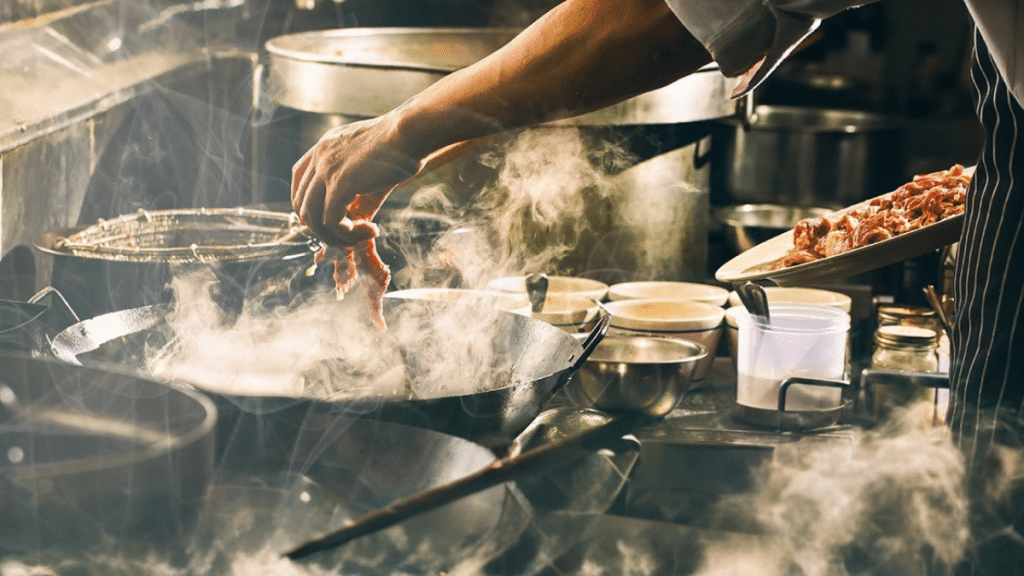Behind the hum of fans and the clang of pans, commercial kitchens are often praised for their precision and cleanliness. But even in the most well-run operations, an overlooked issue simmers beneath the surface. While these spaces focus intensely on hygiene and productivity, they may be releasing far more pollution than anyone realizes—from fumes and wastewater to solid waste. Environmental harm doesn’t always come with a warning sign. Sometimes, it’s tucked into the everyday rhythm of the line.
Pollution You Don’t See—But Might Be Creating
Most kitchen staff don’t think of pollution when they’re frying chicken or scrubbing countertops, but everyday tasks can have a surprisingly broad environmental impact. Frying releases volatile organic compounds (VOCs) and fine particulates into the air, often lingering even after ventilation kicks in. In fact, a study found that during evening cleaning periods in commercial kitchens, particulate matter levels tripled and chlorinated gas concentrations spiked by as much as nine times compared to daytime cooking hours. Refrigeration systems may leak potent greenhouse gases if not properly maintained. Water runoff carries chemical cleaners and grease into sewer systems, affecting aquatic ecosystems. Even the bins tell a story—overflowing with single-use packaging and food scraps that often end up in landfills. Pollution in kitchens is rarely visible, but it’s routinely produced.
Why Ventilation and Waste Systems Might Be Falling Short
Modern kitchens rely on ventilation hoods, filters, grease traps, and drainage systems to keep operations clean and safe. But age, neglect, or outdated design can make these systems less effective than they seem. Filters that aren’t changed regularly let airborne grease and particulates slip through. Grease traps can clog or back up, allowing pollutants to enter local waterways. Some systems, installed years ago, simply weren’t built for current environmental demands. Even with the right infrastructure in place, if it’s not maintained or updated, pollution can escape unnoticed.
Regulations That Vary—and Gaps That Persist
Across regions and sectors, environmental standards in the food service industry are anything but consistent. Large restaurant chains may have the resources to meet stricter standards, while smaller kitchens or rural operations might not face the same scrutiny. Institutional kitchens in schools or hospitals often follow different rules than industrial food processors. And when it comes to enforcement, gaps remain, especially in areas where environmental reporting isn’t required. The result: well-intentioned operators may be polluting simply because they don’t know any better or aren’t required to know.
Cleaner Kitchens Start with Smarter Choices
Environmental impact isn’t just about what comes out of the exhaust or what goes down the drain—it starts with what gets brought into the kitchen. Upgrading to low-VOC appliances, installing closed-loop water systems, or switching to compostable packaging can dramatically reduce waste and emissions. Grease can be collected and repurposed as biofuel. New refrigeration technologies offer better climate performance with fewer leaks. Just as crucially, training staff to spot and prevent pollution transforms sustainability from a checklist item into a shared responsibility.
Time to Rethink What “Clean” Really Means
Commercial kitchens have mastered food safety and operational discipline. Now it’s time to expand the definition of cleanliness to include environmental health. Pollution isn’t always loud or obvious—but the damage adds up quietly over time. Recognizing the environmental footprint of daily kitchen activity isn’t about doing more work; it’s about looking more closely at what’s already being done. Cleaner kitchens start with greater awareness and smarter design.
Martin Alan is the CEO and owner of Vodaland, overseeing operations across the United States, Puerto Rico, and the Virgin Islands. With over a decade of experience in the building technologies industry, he has led efforts in business development, product innovation, and customer-driven solutions. Under his leadership, Vodaland continues to advance smart building solutions—offering high-performance infrastructure products such as solids interceptor, drainage systems, and other water management tools for commercial and industrial applications.
